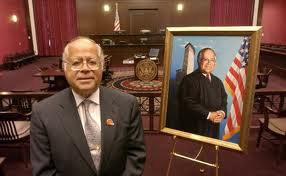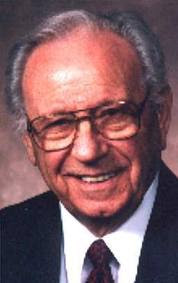 CLEVELAND, Ohio-A bold education plan proposed by Cleveland Mayor Frank Jackson (pictured) and Republican Gov. John Kasich that has angered Cleveland teachers and calls for merit pay, the elimination of seniority and tenure in teacher layoffs, and for a Cleveland schools operating levy with a provision for some of the monies to be allocated for charter schools is not sitting well with Black leaders and some parents, though the Cleveland Plain Dealer Newspaper is pushing it through editorials under the guise of educational reform.
CLEVELAND, Ohio-A bold education plan proposed by Cleveland Mayor Frank Jackson (pictured) and Republican Gov. John Kasich that has angered Cleveland teachers and calls for merit pay, the elimination of seniority and tenure in teacher layoffs, and for a Cleveland schools operating levy with a provision for some of the monies to be allocated for charter schools is not sitting well with Black leaders and some parents, though the Cleveland Plain Dealer Newspaper is pushing it through editorials under the guise of educational reform.
 Cleveland Mayor Frank Jackson (Photograph by The Cleveland Plain Dealer at Cleveland.com www.cleveland.com
Cleveland Mayor Frank Jackson (Photograph by The Cleveland Plain Dealer at Cleveland.com www.cleveland.com
Donna Walker -Brown, below center, with community activist and Oppressed People's Nation Leader Earnest Smith, as Smith talks to a reporter at an educational rally. A Cleveland schools parent who has announced that she will run for mayor in 2013, Walker- Brown has led community protests against Cleveland Mayor Frank Jackson's recent educational plan and against the state law that gives the mayor control of the Cleveland Municipal School District.

 Cleveland Teachers Union President David Quoke
Cleveland Teachers Union President David Quoke

And community activists, in small groups led by Cleveland schools parent Donna Walker- Brown, 41, have protested twice against the plan and mayoral control of the city schools in front of the Cleveland Board of Education, with Walker-Brown announcing last week at a Black on Black Crime meeting that she will challenge Jackson for mayor next year.
"I am against the plan," said Walker-Brown in an previous interview. "It is not good for teacher morale or for the community and we do not need to use money that we need for our public schools to hand to charter schools."
Asked today if she intends to take on Jackson if he seeks a third four -year term for mayor in the non-partisan race in 2013, Walker-Brown, a Black registered Republican, said "yes I do."
Cleveland councilmen Jeff Johnson and Zach Reed have publicly opposed the plan as crafted independently by the Republicans and the Democrat Jackson, who controls the city schools via state law.
They said that Jackson should regroup and questioned his arrogance in developing an education plan that could have a long reaching impact on the community without teachers, Black elected officials, and Black and other parents significantly at the table.
"Why don't you focus more on pushing the Ohio State Legislature to revise its unconstitutional public school funding formula first?," asked Reed of Cleveland schools CEO Eric Gordon, who admitted in a interview two weeks ago with the councilman on his weekly Sun. evening talk show at WTAM 1100 AM radio that Jackson did not consult parents or teachers before unleashing the controversial plan.
"The mayor did not consult parents or teachers but is reaching out to them now," said Gordon, who is White, a statement that stunned some because few if any school operating levies in major metropolitan predominantly Black cities where some Black families often struggle to put food on the table during a national economic crisis can succeed without help from teachers and parents.
Cleveland's last schools operating levy was sanctioned by voters in 1996 with the Cleveland Teachers Union leadership team and parents at the helm.
Still some say that if Jackson won't aggressively speak up for a constitutional public school funding formula, he cannot truly claim to want fair play for the school district that he leads as to his conservative leaning educational plan.
The Ohio Supreme Court in DeRolph vs. The State of Ohio has on at least three occasions ordered the state legislature to revise its unconstitutional school funding formula that because of property taxes allows school districts like the neighboring Cleveland Hts-University Hts. School District and Shaker Hts. schools to spend some $20 thousand annually per student while Cleveland spends about $16 thousand per kid. Yet Ohio's poor students are judged, berated and penalized based upon the same yard stick on standardized test and other measures required by the Ohio State Board of Education.
National Civil Rights activists such as the Rev Al Sharpton have also called for the state legislature to do right by poor children and revise its unconstitutional school funding formula.
The Rev Al Sharpton

"Yes I do, " said Sharpton, when asked at a local church rally last year in Akron for Kelley Williams- Bolar if Kasich should lead the way to encourage the state legislature to comply with DeRolph and revise its unconstitutional school funding formula.
Kelley Williams-Bolar

A Black single parent, Williams- Bolar, 42, made national news for being jailed for nine days after a jury convicted her of felony crimes for falsification for using her father's suburban address to send her two daughters to a neighboring affluent White school district away from the Akron city schools, and away from the ghetto where she and her family live.
With the urging of Sharpton and national educational activists, and some teachers that worked with Williams- Bolar, a former Akron schools teaching assistant that hopes to become a teacher one day, Kasich later reduced the two felony convictions to misdemeanors.
Ohio Gov. John Kasich (R-OH)
 And Jackson is becoming more and more despised by teachers, a no no for a politician and for an educational leader that needs high teacher morale to enhance educational outcomes, whether he has internalized it or not.
And Jackson is becoming more and more despised by teachers, a no no for a politician and for an educational leader that needs high teacher morale to enhance educational outcomes, whether he has internalized it or not.
Two weeks ago Cleveland Teachers Union President David Quoke blasted the Black mayor's plan in an editorial in the Plain Dealer, Ohio's largest newspaper.
Others like educational activist Gerald C. Henley believe that something needs to be done, but with all stakeholders at the table, something required by the since defunct Cleveland schools desegregation court order.
That year the mayoral control state law was instituted, and the school district and State of Ohio were granted unitary status by the late Federal District Court Judge George White, upon his ruling that that the vestiges of racial discrimination had been remedied to the extent practicable and the academic disparities that still exist between Black and White children in the Cleveland schools are due to socioeconomic factors.
White's decision was typical as desegregation court orders were becoming obsolete nationwide, but one that then Cleveland schools parent LuCille short said "hurt Black children." Short wanted at least the provision requiring community input on the hiring of the schools CEO, principals and other administrators to remain intact, as well as the requirement to monitor the successes and failures of Black students in comparison to their White counterparts, both of which were among the 12 remedial orders mandated as part of the desegregation court order.
"We are seeking a dedicated Cleveland parent to lead Parents in Progress to deal with the serious problems that confront the students in the Cleveland Municipal School District and to work collaboratively with the Cleveland Teachers Union to reform the school district," said Henley, a former Cleveland School Board member and founder of Parents in Progress.
Black state legislators from Cleveland such as state representatives Sandra Williams (D-11) , who also chairs The Ohio Legislative Black Caucus, John Barnes Jr. (D-12) and Bill Patmon (D-10), and state senators Shirley Smith (D-21) and Nina Turner (D-25), are not saying a word in support, though Jackson and Kasich have said that they will go around them for a state law from the Republican controlled Ohio State Legislature that puts the plan in stone, continent on the passage of a schools operating levy in November, and absent any successful referendum against it at the ballot box.
Jackson does have the backing of the Cleveland Call and Post as the city's Black press, as he usually does on any issue, regardless of the merits or the community sentiment.
But U.S. Rep. Marcia L. Fudge, a Warrensville Hts Democrat and Ohio's only Black congressperson, whose 11th Congressional District includes the majority Black east side of Cleveland, said that while she supports educational reform, she has not taken a stance on Jackson's educational plan.
"While the congresswoman believes that educational reform is needed, she is still studying the plan and has not taken a position," said Belinda Prinz, Fudge's communications director.
If the proposed state law to institute merit plan and dismantle teacher tenure and seniority in Cleveland schools passes it will only pertain to Cleveland schools, a gesture that community activists say is racist because Black children are being used as they often are as guinea pigs while prominent largely White communities like Shaker Hts. and Beachwood would lobby against the subordination of their teachers, and the undermining of White parents in their district by the absence of viable community input on such a serious community matter.
Jackson has said that his plan is needed to rescue Cleveland children from educational mediocrity and the bottom of the list rankings relative to state education mandates and that it is not anti-union, though it seeks to negate provisions of the teachers collective bargaining agreement through another state law that would eliminate teacher tenure and seniority, and though just last year Ohio voters overwhelmingly repealed Senate Bill 5.
A state law passed earlier this year by the state legislature that, had it not been repealed, would have dismantled collective bargaining for Ohio public employees, SB5 is probably Ohio's most controversial legislation in decades, aside from the proposed heartbeat bill legislation, a bill that makes abortion illegal in Ohio after the first fetal heartbeat is determined.
Reach Kathy Wray Coleman by email at kathy@kathywraycolemanonlinenewsblog.com, and by telephone at 216-932-3114.





